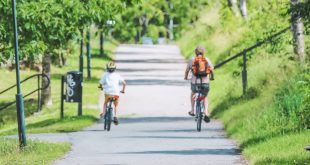Only 25 per cent of primary school children in England are allowed to travel home from school alone, compared with 86 per cent in 1971, according to a new study.
The report, compiled Policy Studies Institute at University of Westminster has pinpointed a dramatic reduction in primary school children’s independence outside the home over the last four decades, including their leisure and recreational activities as well as travelling to and from school.
It’s not just the obvious implications for the growing obesity problem in the UK – obesity has tripled in England in the last 25 years and 30 per cent of children under 15 are overweight or obese (Department for Health stats) – but the lack of independence is bad new for the wellbeing and development of children, the report said.
The independence sapping phenomenon isn’t a worldwide or even European phenomenon necessarily – the study singling out Germany’s children as having much more independence.
The implications for the bike industry are a curbing of child cycling numbers and on the amount of bikes shifted, with cycling missing the same level of opportunity it had in the ’70s to get its hooks into kids as they grow up and potentially become adult cyclists.
Sustrans chief executive Malcolm Shepherd said: “It’s a tragedy that so many of our children are failing to meet recommended physical activity levels but little wonder when parents don’t feel that their local streets are safe.
“We urgently need to make our communities safer if we’re to get kids active by walking and cycling to school and playing outdoors. Parents want to see safer streets – the Government must change the standard speed limit to 20mph on the streets where we live, work and play.
Ben Watson, Research Fellow at the Policy Studies Institute (and one of the authors of the report) said: “Independent mobility has been shown to be good for children’s wellbeing and development, yet our research shows it has dropped significantly in the past four decades. The experience from Germany shows that this drop is not an inevitable result of modern life. If we care about the future health of our children, action should be taken to enable them to regain the right to a safe outdoor environment without the need for adult supervision.”
Play England director Cath Prisk added: “This study confirms our own research that there are more barriers to playing out and travelling independently for children today than for previous generations. Interestingly, the research shows that children in other countries, such as Germany, are able to enjoy this basic right far more than their English peers.
“Parents who want to buck this worrying trend should think about giving their kids the gift of independence at home, on the doorstep, in their neighbourhood and further afield. Play England wants to see communities take control of their own neighbourhoods to ensure that children can play out like they used to. If we want our children and young people to have independence, resilience and everyday adventures they need to start young – it is everyone’s responsibility to make this happen.“
 BikeBiz Bicycle and cycling retail news
BikeBiz Bicycle and cycling retail news



